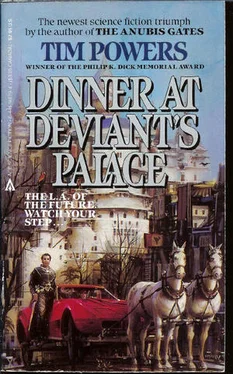«You're right, Greg. Sorry. I shouldn't have listened to the old guy.» He turned to the audience, and Rivas glimpsed the smile flashing back on. «Ladies and gentlemen,» Spink said loudly, «tonight once again we're privileged to have with us Gregorio Rivas, of Venice.»
The applause came right on cue and was satisfactory in volume and duration, and Rivas grinned as arrogantly as ever as he bowed in acknowledgement—but under it he was uneasy. How would the applause sound, he wondered, if I didn't have a few paid prompters in the crowd to lead it? And-how much longer can the dangerous glamor of Venice plausibly cling to me? I've been out of Venice for five years, after all, and while it's true that Steve's standard intro still gets raised eyebrows and shocked whispers from strangers, old Mojo the other day was actually surprised when I mentioned having worked at the Bom Sheltr Bar in Venice—he said he thought that story was just flash for the tourists, like the fake hooter skulls on spikes on the roof.
As the clapping and whistling was tapering off, Rivas turned to Fandango and the twins and impulsively hand-jived the signal for «Everybody Wants to Smoke My Comoy,» his trademark song, which he usually saved for reviving an apathetic audience. Fandango hammered out the staccato opening of the song and the crowd reacted with unmistakably genuine enthusiasm, and for the next few minutes Rivas forgot his doubts and let his singing and playing absorb him totally.
During a lengthy alternation between the steel guitarist and the drummer—a sequence Rivas knew they had no trouble with—he took the opportunity to scan the audience—a little nervously, for he was afraid the Hammond girl might have shown up to make a scene. Spink might have liked it, as being evidence of what a genuine Venetian rake-hell the pelicanist was, but Rivas dreaded such encounters, inevitable though they seemed to be. He peered at each face that he could make out by the illumination of the chandeliers and the tabletop candles, and was relieved not to see her.
And she'd be sure to sit where I would see her, he thought with a slightly drunken shiver. Damn her anyway. Why can't a girl grasp the fact that a breakup can't look tragic to the one initiating it? It can only seem tragic to the one being ditched; to the one doing the ditching it's . . . fresh air, a load off the shoulders, a spring in the step and a whistle on the lips—the very opposite of tragic.
And hell, he thought, it's not as if I haven't drawn that hand as well as dealt it; only once, granted, but I had naively invested so much that time—much more than this Hammond creature ever could have—that I carry the loss with me still, as helplessly as I carry my skeleton, and like the old-time stainless steel it doesn't rust away with time into camouflage colors, but is always as bright as new, and mercilessly reflective.
Rivas turned to the chimes-banger and hand-jived, Remind me later — stainless steel — rust — camouflage colors. The man nodded.
Yes, thought Rivas with some satisfaction, a nice image. Ought to fit well into a song, with some dramatic way of having lost the girl . . . death, maybe . . . suicide even, sure . . .
. . . Anything but the way I actually did lose Urania . . . .
He shied away from the memory of himself at the age of eighteen, crouched behind a bush, in the ruins of a rented suit that stank of brandy and vomit, and, to his everlasting horror, barking like a dog.
Once or twice in the years since, during unusually objective moods, it had occurred to him that he might someday find the memory funny. It had certainly not happened yet.
In any case he was glad the Hammond girl seemed willing to disappear painlessly. He'd found her interesting for a while, but she was no Urania. None of them ever were.
It was nearly time for the pelican to re-enter, and he had just gripped the neck and poised the bow over the taut strings when he noticed at the bar a well-dressed old man who was watching him; and his belly went cold several seconds before he even consciously realized who it was, and he missed his cue.
The steel guitarist looked up in mild surprise and without a falter smoothly began the phrase again.
He had to begin it one more time, though, and let the more attentive members of the audience catch on that something was wrong, for Rivas had now remembered who the old man was and was staring at him with astonishment and hatred and, even after more than a decade, a bit of fear.
«Greg!» whispered Fandango urgently. «Hop aboard!»
Rivas blinked, returned some of his attention to the music, and then at the correct moment slashed the bow across the strings, and the song continued as usual.
He signaled to the other musicians to drop the time-consuming flourishes from the end of the song this time, and, as Fandango obediently rattled out a quick conclusion phrase, Rivas, much soberer now than he'd been a minute ago, lowered his instrument and stepped to the front of the stage.
«We'll be taking a short break now,» he said curtly, and leaving the pelican beside his stool, he hopped down and strode to the bar—and he was able to do it fairly quickly, for even the bleariest of the drinkers seemed to sense a dangerous tautness in him, and pulled in their legs and scooted their chairs closer to the tables to get out of his way.
By the time he stopped in front of the old man his shock had receded enough for him to have deduced what must have happened to bring the man here.
«There's a private room off the kitchen,» Rivas said to him in a voice from which conflicting emotions had leached all inflection. «Wait till we get in there to tell me about it. Whiskey,» he added, more loudly, to Mojo. «Double, with a chaser, now.»
Mojo provided the two filled glasses quickly, and Rivas picked them up and led the old man away from the bar to a door in a shadowed comer.
«Go fetch us a lamp from somewhere,» the pelicanist snapped at the old man as he held both glasses in one hand to open the door with the other. «Hurry now—chop chop!»
The old man's face had been pinched into the expression of someone who has learned that his dinner will consist of the stable boys' leftovers, and the change it underwent now was as though he had been told that he'd have to express gratitude for it too; but he silently did as he was told and went back to get a lamp from the corner of the bar.
Rivas stood by the door and shut it behind them when the old man had returned with the lamp and carried it into the little room. All but filling the chamber was a plastic table with half a dozen chairs around it, and Rivas sat down in one of the chairs and set his drinks in front of himself.
«You should have told Spink who you were this afternoon,» he said. «He'd have been impressed to meet the man who distills Ellay's money.»
The lamp clanked down onto the table and the agitated flame made the two men's shadows fragment and then reform on the wooden walls. «It would do neither of us any good,» came the rasped reply, «to let people know that Irwin Barrows has business with Gregorio Rivas.»
Rivas took a gulp of the whiskey and chased it with a long draught of the beer. «Right,» he said coldly, «in fact why let even Rivas himself know, eh? Who was your touchy negotiator this evening? Some jumped-up vineyard foreman? He didn't handle the approach in a terribly businesslike way—almost wound up challenging me to a duel.»
Irwin Barrows stared at him speculatively. «I considered not telling you this,» he said finally, «but I will, because I don't think it will alter your decision. Montecruz can be excused, perhaps, for showing some heat—you see, he's her fiancй. They're to be—they were to be—married next month.»
Читать дальше












